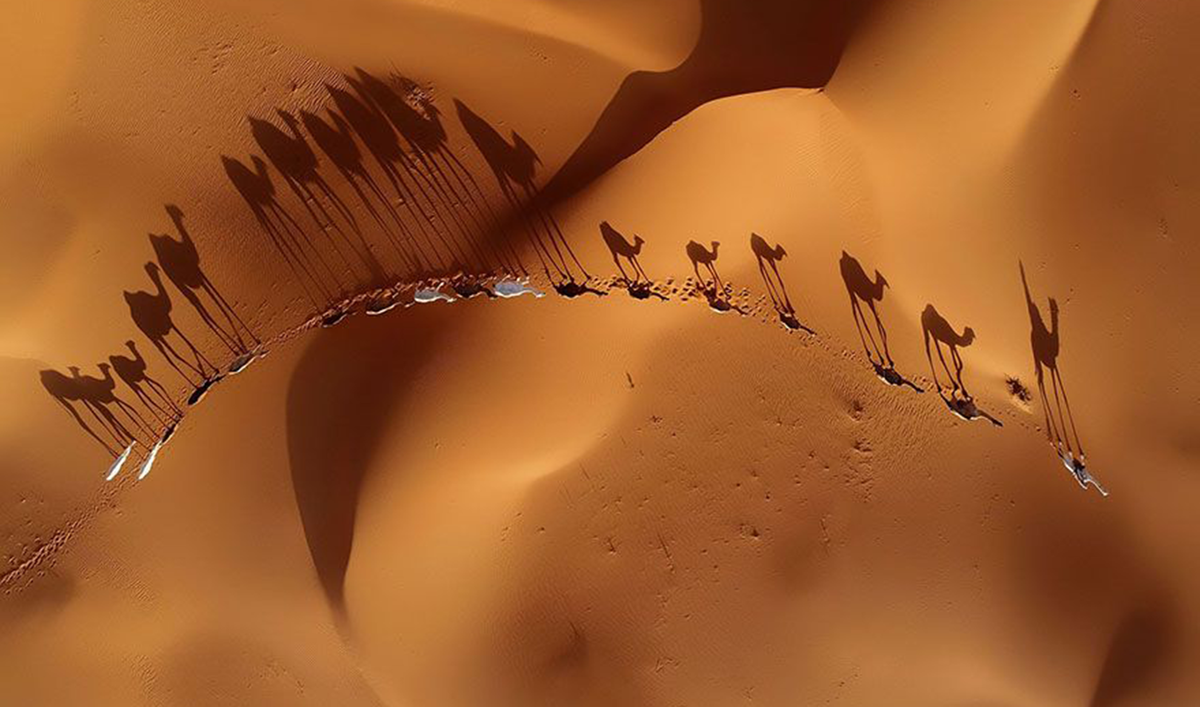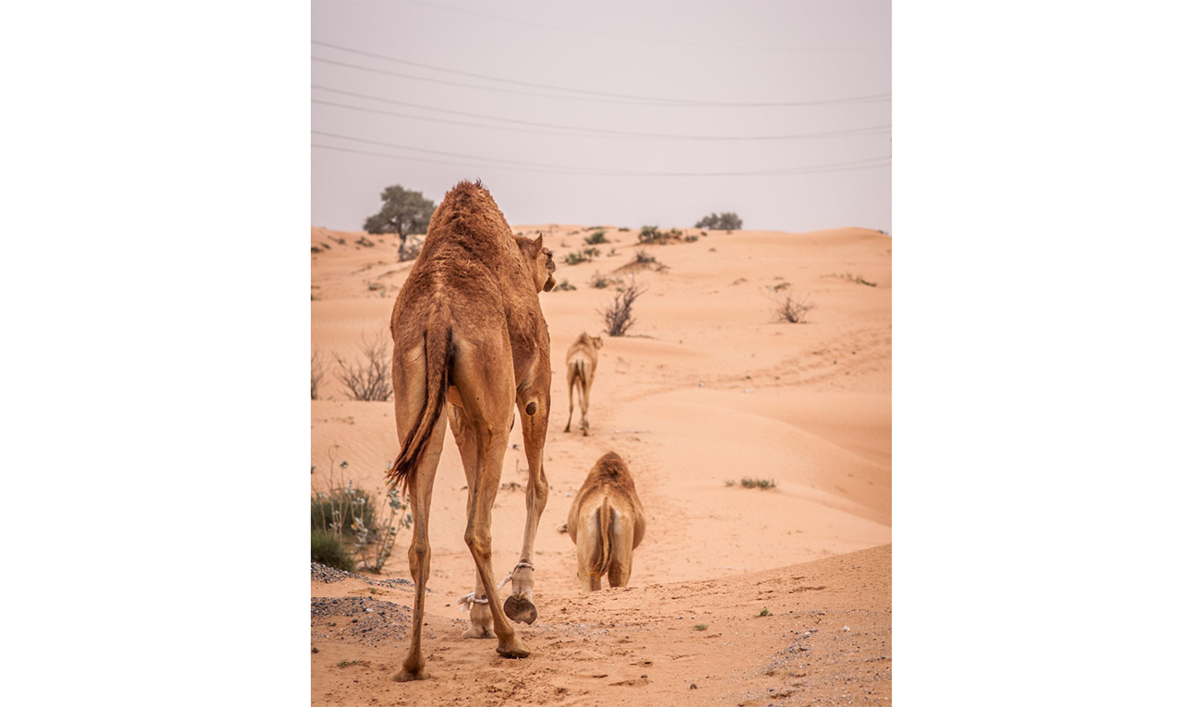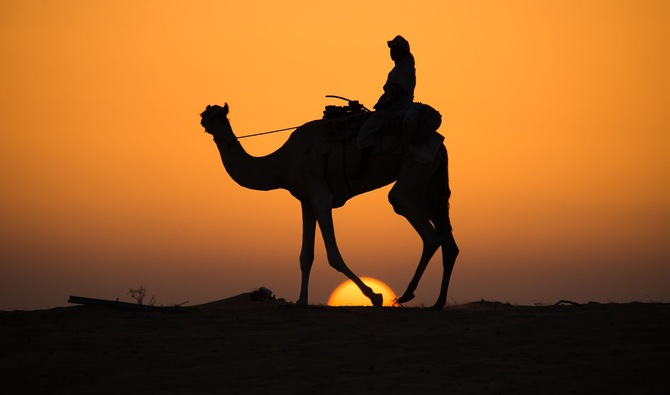JEDDAH: The Saudi Heritage Preservation Society (SHPS) and Ministry of Culture (MoC) are preparing a draft proposal to inscribe one of the oldest forms of singing in the region on UNESCO’s Representative List of the Intangible Heritage of Humanity by 2021.
Ghna’a Al-Rukban, the music of the riders in Arabic, is the oldest musical genres in Arabia. It emerged long centuries before the emergence of Islam and symbolizes the close relationship between a camel and its shepherd.
It includes the form of singing known as Al-Hida’a or Al-Huda’a, which takes its name from the “hadi”, the camel driver or shepherd. This is more than just a means to get the camel to move faster or stimulate the herd to gather around the hadi when he sings. It also acts as a form of entertainment for both the driver and his camel and fills their time as they journey long across the empty deserts of the Arabian Peninsula.
According to SHPS, this form of singing is one of the most important forms of verbal expressions practiced in the Arabian Peninsula. Something similar is practised anywhere in the world where camels exist.
The SHPS and MoC are working to register this authentic Arabic tradition in collaboration with the UAE and Oman.
“The importance of Al-Hida’a comes from its reflection of human creativity in communicating with the components of the environment in which people live. Through this art, humans were able to find a way to communicate effectively with camels,” said Dr. Sultan Al-Saleh, the director of the heritage department at SHPS.
Saudi Arabia took the initiative in filing the proposal to UNESCO “since Al-Hida’a is a shared tradition among several cultures and societies in the region. Many countries were invited to participate and the UAE and Oman were the two willing to take part,” Al-Saleh told Arab News.
However, each participating country will prepare a separate file focusing on the practice of this heritage in their own community. These files will be merged later.
“Our team had been searching for and meeting with practitioners of this art and documenting their practices, narrations and knowledge about this tradition using visual and written means,” said Al-Saleh. “This is the best possible approach at the beginning of any documentation journey.”

Saudi Arabia expects Al-Hida’a to be inscribed on UNESCO’s Representative List of the Intangible Heritage of Humanity by the end of 2021, but the documentation process of this tradition continues and is constantly updated by SHPS researchers, Al-Sultan said.
The UNESCO list classifies its components under five categories; Al-Hida’a falls under that of oral traditions and expressions.
“Oral heritage is transmitted between generations verbally through narration and anecdote, therefore many of its elements may be lost if it is not documented,” Al-Saleh said.
As an official partner to UNESCO World Heritage Centre, SHPS follows its adopted methodology in documenting intangible cultural heritage.
Al-Saleh said what adds to its beauty is the fact that Al-Hida’a singing varies according to where the human and the camel are living, “For instance, our team has visited different regions in the Kingdom where this art is performed and found a vast difference on choice of words, melodies used and styles,” he said.
The camel is a distinct symbol of the desert and the Middle East, in the eyes of many Arabs, and is a creature of great beauty. The camel has played a central role in the historical development of Arabic society — where an elaborate vocabulary and extensive literature have been devoted to it. Saudi anthropologist Saad Al-Suwaiyan dedicated the sixth volume of his series “Traditional Culture of Saudi Arabia,” to this animal and its significance in the Saudi culture on different levels, including language, culture, art and singing.
Al-Hida’a is said to date back to a time where a camel driver fell from his camel and broke his arm. The story goes that when he shouted “Oh my hand! Oh my hand!” his voice made the camels surround him and follow him without effort. The drivers realized the effect of singing on camels — that it was an easier and kinder way to lead their herds. This led to the exclusion of other coercive measures such as hitting or poking on the animal’s stomach.
Some history books said the man in the story who became the first “hadi” was the Prophet Mohammad’s 17th great grandfather, Mudhar bin Nizar. Arabs inherited the tradition later on; it began with using usually incomprehensible words to lead the herd of camels, but it evolved with time as a form of poetry structured on the rajaz meter in a rhythmical beat which the camels loved. The camels would put down their heads, stretch their necks out and with a lengthened pace shuffle forward musingly while the song lasted. It is said that the rhythm used conforms to the lifting and lowering of the camel’s feet.

Al-Hida’a poetry addressed topics such pride, love, friendship, and war. It also had different styles or tones based on the occasion and was influenced by the harsh life in the desert. Arabs used to sing Al-Hida’a homecoming songs and other songs to celebrate reaching the water well, the basic source of life.
Furthermore, the art form was mentioned in many important texts by Arab and Muslim writers. For instance, in his book “The Revival on Religious Sciences” the Muslim scholar Abu Hamid Al-Ghazali mentioned Al-Huda tradition to argue for the permissibility of music and defend the instinctive experience on ecstasy related to it.
Al-Ghazali wrote, “And the camel, in spite of his stupidity in nature, feels the effect of the driving-song to such a degree that, hearing it, he counts heavy loads light, and, in the strength of his alacrity through listening to it, holds long distances short; such an alacrity is aroused in him as intoxicates and distracts him. Then, as the desert grow long to them and fatigue and weariness under the loads and burdens seize upon them, whenever they hear someone striking up the drinking-song you will see how they extend their necks and pay attention to the singer with ears erect, and hasten in their pace till the loads and burdens shake them up; and often they kill themselves from the force of the pace and the weight of the burdens, while the do not perceive it through alacrity.”
In addition, the founder of Saudi Arabia, King Abdulaziz Al-Saud himself, was a poet and wrote many poems in Al-Hida’a style, where he told stories and expressed the thoughts and feelings he experienced through his battles uniting the country, poems which remain a living source of this country’s oral history.
Moreover, many contemporary artists perform songs celebrating this Arabic heritage, such as the collaboration between the late Tunisian singer Thekra and Libyan artist Mohamed Hassan, where they tried to document the desert singing through modern musical means, most famously in the song “Hida’a Al-Ebel.”
Other artists also featured this tradition in their songs: “Ya Jammal” by the late Palestinian singer Rim Banna, the Lebanese musician Marcel Khalifah singing “Ya Hadi Al Eys,” a poem by Mahmoud Darwish, or Syrian singer Sabah Fakhri performing Mohammed Abul-Qasim’s poem “Ya Had Al Eys.”
Today, Al-Hida’a is still practiced to control camels across different countries, but this form of singing also exists in a more complicated style in the form of poetry dedicated to occasions such as weddings.






















